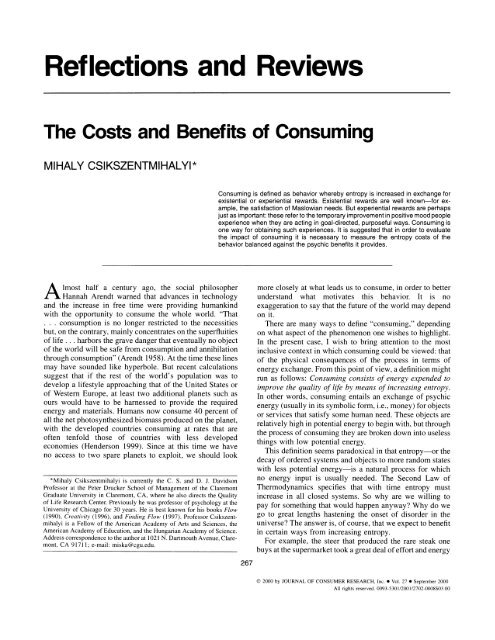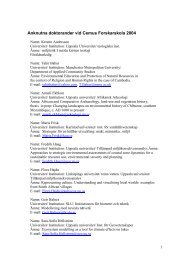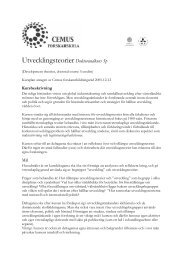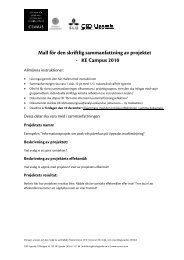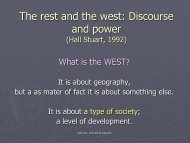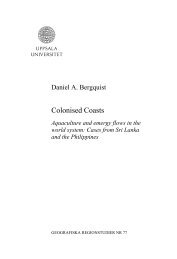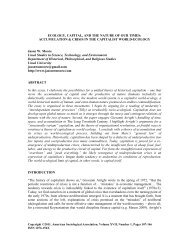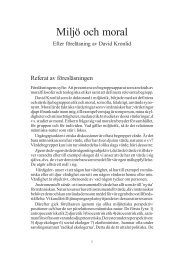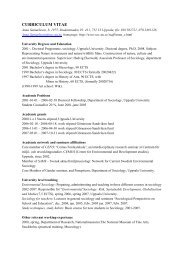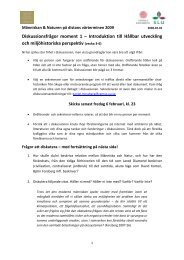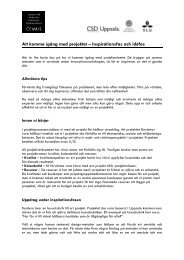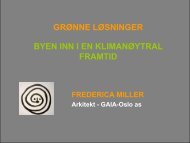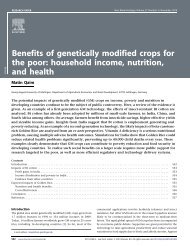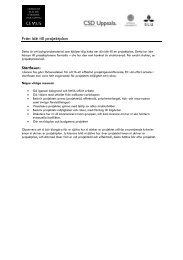<strong>The</strong> <strong>Costs</strong> <strong>and</strong> <strong>Benefits</strong> <strong>of</strong> <strong>Consuming</strong>MIHALY CSIKSZENTMIHALYI*<strong>Consuming</strong> is defined as behavior whereby entropy is increased in exchange forexistential or experiential rewards. Existential rewards are well known-for example,the satisfaction <strong>of</strong> Maslowian needs. But experiential rewards are perhapsjust as important: these refer to the temporary improvement in positive mood peopleexperience when they are acting in goal-directed, purposeful ways. <strong>Consuming</strong> isone way for obtaining such experiences. It is suggested that in order to evaluatethe impact <strong>of</strong> consuming it is necessary to measure the entropy costs <strong>of</strong> thebehavior balanced against the psychic benefits it provides.A lmost half a century ago, the social philosopherHannah Arendt warned that advances in technology<strong>and</strong> the increase in free time were providing humankindwith the opportunity to consume the whole world. "That. . . consumption is no longer restricted to the necessitiesbut, on the contrary, mainly concentrates on the superfluities<strong>of</strong> life . .. harbors the grave danger that eventually no object<strong>of</strong> the world will be safe from consumption <strong>and</strong> annihilationthrough consumption" (Arendt 1958). At the time these linesmay have sounded like hyperbole. But recent calculationssuggest that if the rest <strong>of</strong> the world's population was todevelop a lifestyle approaching that <strong>of</strong> the United States or<strong>of</strong> Western Europe, at least two additional planets such asours would have to be harnessed to provide the requiredenergy <strong>and</strong> materials. Humans now consume 40 percent <strong>of</strong>all the net photosynthesized biomass produced on the planet,with the developed countries consuming at rates that are<strong>of</strong>ten tenfold those <strong>of</strong> countries with less developedeconomies (Henderson 1999). Since at this time we haveno access to two spare planets to exploit, we should look*Mihaly Csikszentmihalyi is currently the C. S. <strong>and</strong> D. J. DavidsonPr<strong>of</strong>essor at the Peter Drucker School <strong>of</strong> Management <strong>of</strong> the ClaremontGraduate University in Claremont, CA, where he also directs the Quality<strong>of</strong> Life Research Center. Previously he was pr<strong>of</strong>essor <strong>of</strong> psychology at theUniversity <strong>of</strong> Chicago for 30 years. He is best known for his books Flow(1990), Creativity (1996), <strong>and</strong> Finding Flow (1997). Pr<strong>of</strong>essor Csikszentmihalyiis a Fellow <strong>of</strong> the American Academy <strong>of</strong> Arts <strong>and</strong> Sciences, theAmerican Academy <strong>of</strong> Education, <strong>and</strong> the Hungarian Academy <strong>of</strong> Science.Address correspondence to the author at 1021 N. Dartmouth Avenue, Claremont,CA 91711; e-mail: miska@cgu.edu.267more closely at what leads us to consume, in order to betterunderst<strong>and</strong> what motivates this behavior. It is noexaggeration to say that the future <strong>of</strong> the world may dependon it.<strong>The</strong>re are many ways to define "consuming," dependingon what aspect <strong>of</strong> the phenomenon one wishes to highlight.In the present case, I wish to bring attention to the mostinclusive context in which consuming could be viewed: that<strong>of</strong> the physical consequences <strong>of</strong> the process in terms <strong>of</strong>energy exchange. From this point <strong>of</strong> view, a definition mightrun as follows: <strong>Consuming</strong> consists <strong>of</strong> energy expended toimprove the quality <strong>of</strong> life by means <strong>of</strong> increasing entropy.In other words, consuming entails an exchange <strong>of</strong> psychicenergy (usually in its symbolic form, i.e., money) for objectsor services that satisfy some human need. <strong>The</strong>se objects arerelatively high in potential energy to begin with, but throughthe process <strong>of</strong> consuming they are broken down into uselessthings with low potential energy.This definition seems paradoxical in that entropy or thedecay <strong>of</strong> ordered systems <strong>and</strong> objects to more r<strong>and</strong>om stateswith less potential energy is a natural process for whichno energy input is usually needed. <strong>The</strong> Second Law <strong>of</strong><strong>The</strong>rmodynamics specifies that with time entropy mustincrease in all closed systems. So why are we willing topay for something that would happen anyway? Why do wego to great lengths hastening the onset <strong>of</strong> disorder in theuniverse? <strong>The</strong> answer is, <strong>of</strong> course, that we expect to benefitin certain ways from increasing entropy.For example, the steer that produced the rare steak onebuys at the supermarketook a great deal <strong>of</strong> effort <strong>and</strong> energy? 2000 by JOURNAL OF CONSUMER RESEARCH, Inc. 0 Vol. 27 0 September 2000All rights reserved. 0093-5301/2001/2702-0008$03.00
268 JOURNAL OF CONSUMER RESEARCHto raise, feed, butcher, <strong>and</strong> transport. It contains a relativelyhigh number <strong>of</strong> calories, proteins, <strong>and</strong> other substances thatcan be transformed into work. Because <strong>of</strong> this, it has acertain value. After the steak is consumed, however, itsmaterials are broken down into waste with low potentialenergy <strong>and</strong> no value.But as the food is transformed into waste, energy isliberated <strong>and</strong> transferred to the consumer. So the process <strong>of</strong>eating is not wasteful because the energy that went into theproduction <strong>of</strong> the steak goes to increase the diner's energy(however, one might point out that compared to eating otherfoods, eating steaks is relatively more wasteful). By contrast,most consumption provides little or no return <strong>of</strong> this kindto the consumer. Let us imagine, for instance, a father wh<strong>of</strong>eels the need to demonstrate his love for his small son bybuying an expensive electric car for his birthday. Buildingthe car took some raw materials, manufacturing effort, agreat deal <strong>of</strong> marketing, salesmanship, <strong>and</strong> transportationcosts. <strong>The</strong> price tag took a not indifferent bite out <strong>of</strong> thefather's pocketbook. For a few hours the boy plays with thecar, <strong>and</strong> father <strong>and</strong> son have some mildly pleasant time out<strong>of</strong> it. But soon the novelty wears <strong>of</strong>f. <strong>The</strong> car does not runwell on the carpet or the sidewalk, so the boy takes it outmore <strong>and</strong> more rarely. Now it sits in the basement, a uselesshulk slowly turning to rust, taking up space. Is the result <strong>of</strong>such consumer behavior a net increase in entropy or not?Of course if one took into account the entire cycle <strong>of</strong>production <strong>and</strong> consumption we might see a differentpicture. Production entails a negentropic activity one thattakes raw materials <strong>and</strong> turns them into useful goods. Yetproduction also creates disorder in the planetary system:agrobusiness leaves dangerous chemical residues <strong>and</strong>washes away fertile topsoil; manufacture creates pollutants<strong>and</strong> exhausts limited natural resources. So to calculate thenet effect <strong>of</strong> consumption one first needs to add up thepositive outcomes: the increase in order due to productiveprocesses, <strong>and</strong> the improvement in the quality <strong>of</strong> life. <strong>The</strong>none should subtract from this the negative outcomes: theentropy caused by the processes <strong>of</strong> production, <strong>and</strong> theentropy caused by using up the goods produced. If the resultis negative, it means that consumption is accelerating therate <strong>of</strong> decay; if positive, it suggests that it helps theevolution <strong>of</strong> order in the universe. In the present essay, Iam going to focus only on one term <strong>of</strong> this equation: howdoes consumption improve the quality <strong>of</strong> life?HOW CONSUMER BEHAVIOR MEETSEXISTENTIAL NEEDSBecause consumer behavior is largely driven by the desireto satisfy needs that have been programmed in our mindseither by the genes we inherit or the memes' we learn from'A "meme" is a concept introduced by the British biologist RichardDawkins (1976) to refer to programmed behavioral units that are learned,rather than inherited genetically. It derives from the Greek word for imitation,mimesis. Several writers have found the concept useful for describingthe production, selection, <strong>and</strong> transmission <strong>of</strong> cultural information (e.g.,Blackmore 1999: Csikszentmihalyi 1993; Wright 2000).the culture in which we live, it is useful to start the analysiswith a consideration <strong>of</strong> human needs. Of the many taxonomiesdeveloped by psychologists, the one by AbrahamMaslow (1968, 1971) is one <strong>of</strong> the most succinct, <strong>and</strong> onethat is familiar to students <strong>of</strong> consumer behavior (Kilbourne1987). <strong>The</strong> model involves only five factors or levels, <strong>and</strong>it is reasonably comprehensive. We might, therefore, use itto help with a preliminary classification <strong>of</strong> what motivatesconsumer behavior.<strong>The</strong> "Lower" Needs: Survival <strong>and</strong> SafetyAccording to Maslow's theory, the most basic needs thatmotivate a person are physiological survival needs: to eat,drink, have sex, breathe, sleep, be warm, <strong>and</strong> eliminate.When these needs are not met, the person will turn all <strong>of</strong>his or her psychic energy to the task <strong>of</strong> satisfying them. Butas soon as these needs are met, a "higher" set <strong>of</strong> needs willusually attract a person' s attention. A great deal <strong>of</strong> consumerbehavior is directed to satisfy survival needs: food, clothing,<strong>and</strong> shelter being paramount. However, as we shall see later,rarely does a product or service satisfy only basic needs; itis more usual for a whole range <strong>of</strong> lower <strong>and</strong> higher needsto be involved in every consumer exchange.Next on Maslow's hierarchy are safety needs: to live ina stable, predictable environment <strong>and</strong> to be free <strong>of</strong> anxiety.Many consumer decisions are prompted by safety needs,from buying a house in a "good" neighborhood to buyinga h<strong>and</strong>gun or antidepressant drugs. Other exchanges, includingpaying to get an advanced academic degree, or investingin retirement annuities, are also prompted at leastin part by the desire to achieve security.Love <strong>and</strong> BelongingMidpoint in Maslow's scheme, the need for love <strong>and</strong>belonging is rooted in our fear <strong>of</strong> isolation <strong>and</strong> loneliness.Social animals like humans are genetically programmed toseek out the company <strong>of</strong> other members <strong>of</strong> the species. Whenalone (<strong>and</strong> especially when no pressing task dem<strong>and</strong>s attention),the quality <strong>of</strong> experience for most people declines;depression <strong>and</strong> bad mood take over (Csikszentmihalyi1991). In addition to this generic need for human company,human beings have also evolved a more specific desire tobe close <strong>and</strong> to share the experiences <strong>of</strong> one or a few otherpersons, usually <strong>of</strong> the opposite sex. Thus, a need for affection,to love <strong>and</strong> be loved, is also fundamental to humanmotivation.<strong>The</strong> implications <strong>of</strong> this set <strong>of</strong> needs for consumer behaviorare many <strong>and</strong> diverse. For example, bars, restaurants,sport arenas, museums, <strong>and</strong> concert halls provide opportunitiesto mix with others, to see <strong>and</strong> be seen. <strong>The</strong> entireentertainment industry is predicated on experiencing goodtimes vicariously in the company <strong>of</strong> virtual fellow revelers.<strong>The</strong> psychic energy <strong>of</strong> consumers is targeted with ads thatshow masses <strong>of</strong> young people partying on beaches or inbars. If you buy this product, the subtext says, you will nothave to be alone ever again.


